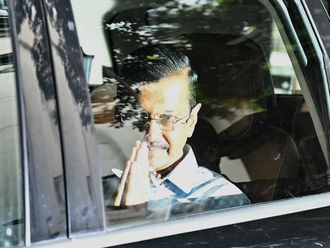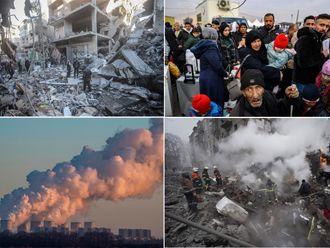
It's been a full year since I had the privilege of witnessing and writing about Iran's fateful election. However, I am still left wondering which story is more lasting — the actual political upheaval that tore through Iranian society or the worldwide media frenzy that misread most of it.
A year after trashing the line between analysis and advocacy, most "experts" and media personalities are backpedalling after getting the story so wrong. While the error of indulging in fantasies such as the "Twitter revolution" and the collapsing Islamic Republic may be understandable, I wonder if the flawed logic that allowed for such fallacies is. This matters only because bad analysis leads to terrible policy. Let us review.
Unfortunately, the "Green movement" that promised to finally end the clash of civilisations and usher in the cosmic triumph of liberal democracy may never have been more than an accidental convergence of forces.
Whether because of the crackdown by state forces or a systemic lack of leadership and direction (probably both), Mir Hussain Mousavi's green-clad campaigners that shocked the world after the election quickly fractured and returned to their previous social divisions leaving only a hard core of dissenters willing to confront the regime.
The masses that filled the street last June have long since returned either to their Bazaar shops, traditional religious services, or villas in northern Tehran.
Nonetheless, even today experts operate under the wishful assumption that there actually is an identifiable pro-democracy movement in Iran that represents the majority of society. When the green movement steadily dwindled instead of strengthened over the year, our leading educators responded by promising an "eventual win" or reminding us that "it's a gradual fight".
Fractured regime
In the face of no-show protest rallies, they told us of increased internet chatter and midnight rooftop shouts, when they should have simply told us about the realities.
These same analysts have taken insider criticism of Mahmoud Ahmadinejad such as that rendered by the Larijani brothers as a sign of a fractured regime instead of recognising the reconsolidation of a traditional, yet weary, clerical base. They read Akbar Hashemi Rafsanjani's year-long silence as the calculated tactic of a shrewd politician instead of the retreat of an ageing and defeated mafia don preserving his seat. Make no mistake the political upheaval in Iran was tremendous, but it was nothing close to what we imagined it to be.
The result of this expert advice has gotten us where? A year after the elections Iran is still a theocracy, it is no closer to halting its uranium enrichment programme, it still plays king maker in Iraq, and the fate of the Strait of Hormuz still rests on a hair trigger.
In fact, it can be safely said that since the Iranian revolution itself, the supposed experts and the politicians who listen to them have only pursued a singular track of error when dealing with Iran. What they don't seem to accept is what has been so obvious for so long - the Islamic Republic of Iran is not going anywhere anytime soon.
Complete farce
Not only has this made a complete farce of international legal institutions and the values they are meant to bolster, it has served the exact opposite of the intended goal: After 30 years of boycott and repeated Israeli fiascos, Lebanon is now effectively ruled by Hezbollah. After the longest war in US history, the Taliban refuse to negotiate because it is confident that it is the one winning.
Liberal idealism may be nice for the classroom, but it has no place in the world of realpolitik.
Nor in the age of Gaza flotillas, Baha Mousas, and Guantanamo Bays does it have right to even raise its head.
Thankfully in the case of Iran there has been a quiet and steady stream of realist coverage that has gotten the story right over the last 12 months. Most notably Washington-based analysts Flynt Leverett and Hillary Mann and London-based Mehrdad Khonsari have offered assessments that present a realistic picture of what is happening and how to proceed. Ironically, we should also appreciate the pragmatic attitudes in the White House and Pentagon which have thus far at least prevented an even further descent into chaos in the Middle East.
It has been painful watching the political degeneration unfold in Iran over the last year, but just as tormenting has been seeing the chronic refusal of western intelligentsia to understand the entrenched nature of Islamic politics in Muslim societies.
The question here isn't just about how to tell a story, it is about how to deal with the reality in the 21st century. It remains to be seen whether our leaders and educators will take the natural steps of accepting Islamic experiments in modern governance and then seeking honest and equitable avenues for engagement. I just hope it doesn't take another Twitter Revolution.
Abbas Barzegar is a PhD candidate in religious studies at Emory University, Atlanta, Georgia.



_resources1_16a45059ca3_small.jpg)






